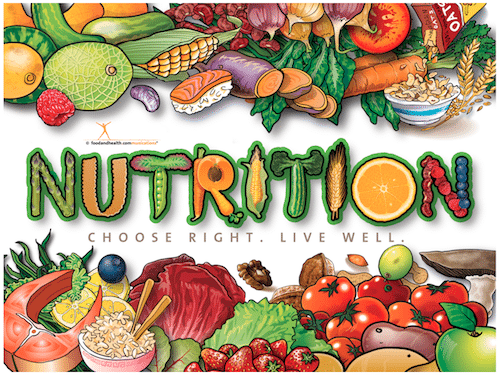Great Health Great Fitness
“Fueling Your Body: A Comprehensive Guide to Optimal Nutrition”
A Comprehensive Guide to Optimal Nutrition" delves into the intricate interplay of nutrients that form the foundation of a healthy lifestyle. From the importance of macronutrients like carbohydrates, proteins, and fats to the role of micronutrients such as vitamins and minerals, this guide equips readers with the knowledge to make informed dietary choices. Whether you're seeking to enhance athletic performance, maintain a healthy weight, or simply improve overall well-being, this comprehensive resource provides invaluable insights to fuel your body for success.

Understanding the Basics: The Body’s Building Blocks of Nutrition
Nutrition is the cornerstone of a healthy and vibrant life. The food Body we consume serves as the fuel that powers our bodies, impacting not only our physical health but also our mental well-being, Body. In this blog post, we’ll embark on a journey into the realm of nutrition, body, exploring the importance of a balanced diet, the role of various nutrients, and practical tips for making informed food choices.
One of the key principles of nutrition is balance. A balanced diet encompasses a variety of foods from different food groups, including fruits, vegetables, whole grains, lean proteins, and healthy fats. Each food group offers a unique array of nutrients, vitamins, and minerals that are essential for overall health. Body By incorporating a diverse range of foods into our meals, we can ensure that our bodies receive the full spectrum of nutrients they need to thrive.
In addition to balance, moderation is another important aspect of healthy eating. While it’s important to enjoy a wide variety of foods, it’s also crucial to be Body mindful of portion sizes and avoid overconsumption of foods high in sugar, saturated fats, and sodium. By practicing moderation and portion control, we can maintain a healthy weight, regulate blood sugar levels, and reduce the risk of obesity and related health conditions.
1. Understanding the Basics: The Building Blocks of Nutrition

Delve into the fundamental components of nutrition, breaking down macronutrients (carbohydrates, proteins, and fats) and micronutrients (vitamins and minerals). Explain their roles in supporting various bodily functions and highlight the importance of a well-rounded diet.
In addition to macronutrients, micronutrients, namely vitamins and minerals, play vital roles in supporting various bodily functions and maintaining overall health. Vitamins, such as vitamin A, C, D, E, and B-complex vitamins, act as coenzymes and antioxidants, facilitating metabolic processes, supporting immune function, and promoting cell growth and repair. Minerals, including calcium, magnesium, iron, zinc, and potassium, are essential for bone health, nerve function, muscle contraction, and electrolyte balance.
Emphasizing the importance of a well-rounded diet rich in diverse whole foods ensures an adequate intake of both macronutrients and micronutrients. Incorporating a variety of fruits, vegetables, whole grains, lean proteins, and healthy fats into meals promotes nutrient diversity and balance, supporting overall health and vitality. By understanding the roles of macronutrients and micronutrients and prioritizing a nutrient-dense diet, individuals can optimize their nutritional intake, promote wellness, and reduce the risk of chronic diseases.
2. The Power of Balance: Creating Nutrient-Rich Meals

Explore the concept of a balanced diet, emphasizing the need for variety and moderation. Provide guidance on incorporating fruits, vegetables, whole grains, Body ,lean proteins, and healthy fats into daily meals to ensure a diverse range of nutrients.
Fruits and vegetables are rich sources of vitamins, minerals, fiber, and antioxidants, making them vital components of a balanced diet. Aim to include a colorful assortment of fruits and vegetables in your meals, as different colors indicate different phytonutrients and antioxidants that offer unique health benefits. Incorporating a variety of fruits and vegetables into your diet not only ensures a diverse range of nutrients but also adds flavor, texture, and visual appeal to meals.
Whole grains, such as brown rice, quinoa, oats, and whole wheat bread, are excellent sources of complex carbohydrates, fiber, vitamins, and minerals. Including whole grains in your meals provides sustained energy, supports digestive health, and helps regulate blood sugar levels Body. When choosing grains, opt for minimally processed varieties to maximize nutrient content and minimize added sugars and refined carbohydrates.
Lean proteins, including poultry, fish, tofu, legumes, and low-fat dairy products, are essential for building and repairing tissues, synthesizing enzymes and hormones, and supporting immune function. Incorporate a variety of protein sources into your meals to ensure adequate intake of essential amino acids and promote muscle health, satiety, and weight management.
3. Hydration: The Unsung Hero of Nutrition

Discuss the often underestimated role of water in maintaining good health. Explore the importance of hydration for digestion, nutrient absorption, and overall bodily functions. Provide tips for staying adequately hydrated throughout the day.
The role of water in maintaining good health cannot be overstated; it is fundamental to the proper functioning of nearly every system in the body. Hydration is essential for digestion as it helps to break down food, aids in the absorption of nutrients, and supports the movement of waste through the digestive tract. Body Without an adequate intake of water, digestive processes can become sluggish, leading to issues such as constipation and bloating.
Furthermore, water plays a crucial role in nutrient absorption. Many vitamins and minerals require water to be absorbed and transported throughout the body. For example, water-soluble vitamins like vitamin C and B vitamins are absorbed more efficiently in the presence of water. Similarly, minerals such as calcium and magnesium rely on water for proper absorption and utilization by the body.
Hydration is also vital for overall bodily functions beyond digestion and nutrient absorption. Water is involved in regulating body temperature through processes such as sweating and evaporation. It lubricates joints and cushions organs, helping to prevent friction and injury. Additionally, water is essential for maintaining proper blood volume and circulation, which is necessary for delivering oxygen and nutrients to cells and removing waste products from the body.
4. Navigating the Sea of Diets: Finding What Works for You
Examine popular diets such as Mediterranean, ketogenic, vegetarian, and others, discussing their principles, benefits, and potential drawbacks Body . Emphasize the importance of choosing a sustainable and balanced approach that aligns with individual preferences and health goals.
On the other hand, the ketogenic diet is a high-fat, low-carbohydrate eating plan that aims to induce a state of ketosis, where the body burns fat for fuel instead of carbohydrates. It has shown promise for weight loss and improving blood sugar control in some individuals, but it may be challenging to sustain long-term and can lead to nutrient deficiencies if not carefully planned. Additionally, it may not be suitable for everyone, particularly those with certain medical conditions or athletes requiring high-intensity exercise performance.
Vegetarian diets, which exclude meat and seafood but may include dairy and eggs (lacto-ovo vegetarian), or exclude all animal products (vegan), can offer numerous health benefits when well-planned. Body They tend to be high in fiber, vitamins, and phytonutrients and may be associated with a lower risk of chronic diseases such as heart disease and certain cancers. However, they may require careful attention to ensure adequate intake of essential nutrients such as protein, iron, calcium, and vitamin B12, particularly for vegans who exclude all animal products from their diet.
5. Mindful Eating: Cultivating a Healthy Relationship with Food
Explore the concept of mindful eating, encouraging readers to pay attention to hunger and fullness cues, savor the flavors of each bite, and cultivate a positive relationship with food. Body Discuss the impact of mindful eating on overall well-being and digestion.
One of the key principles of mindful eating is tuning into hunger and fullness cues, also known as intuitive eating. Rather than relying on external cues such as the time of day or the size of a portion, mindful eaters listen to their bodies and eat in response to physical hunger. This helps prevent overeating and promotes a healthier relationship with food, as individuals learn to trust their Body signals and eat according to its needs.
Additionally, mindful eating encourages individuals to savor the flavors, textures, and aromas of their food, engaging all of the senses during meals. By fully immersing themselves in the eating experience, individuals can derive greater pleasure and satisfaction from their food, Body leading to a more enjoyable and fulfilling eating experience.
Mindful eating also has a profound impact on digestion. When individuals eat mindfully, they are more likely to chew their food thoroughly and eat at a slower pace, which aids in the digestive process. Chewing food thoroughly allows for better breakdown of food particles and increases the release of digestive enzymes in the mouth, stomach, and intestines, leading to improved nutrient absorption and reduced digestive discomfort.
6. Functional Foods: Maximizing Health Benefits through Nutrition

Introduce the concept of functional foods—foods that offer health benefits beyond basic nutrition. Discuss examples such as berries, nuts, and fatty fish, and explore their potential impact on preventing chronic diseases and promoting longevity.
Berries, such as blueberries, strawberries, raspberries, and blackberries, are rich in antioxidants, particularly flavonoids and polyphenols, which have anti-inflammatory and antioxidant properties. These compounds help protect cells from damage caused by free radicals, reducing the risk of chronic diseases such as heart disease, cancer, and neurodegenerative disorders. Body Additionally, berries have been associated with improved cognitive function, enhanced immune function, and better blood sugar control.
Nuts and seeds are another example of functional foods that offer numerous health benefits. They are rich in heart-healthy fats, protein, fiber, vitamins, and minerals, making them a nutrient-dense addition to any diet. Consuming nuts and seeds regularly has been linked to a reduced risk of heart disease, stroke, and type 2 diabetes. Additionally, the anti-inflammatory properties of nuts and seeds may help lower inflammation levels in the body and improve overall health.
Fatty fish, such as salmon, mackerel, trout, and sardines, are renowned for their high content of omega-3 fatty acids, particularly EPA (eicosapentaenoic acid) and DHA (docosahexaenoic acid). These essential fatty acids play a crucial role in brain health, heart health, and reducing inflammation throughout the body. Regular consumption of fatty fish has been associated with a lower risk of heart disease, improved cognitive function, and reduced inflammation, leading to better overall health Body and longevity.
7. Eating for Energy: Foods that Boost Vitality
Highlight energy-boosting foods that provide sustained energy throughout the day. Discuss the importance of complex carbohydrates, lean proteins, and healthy fats in maintaining steady blood sugar levels and avoiding energy crashes.
Energy-boosting foods play a crucial role in maintaining optimal energy levels throughout the day, providing sustained fuel for both physical and cognitive activities. These foods are rich in nutrients that support steady blood sugar levels and help avoid energy crashes, Body including complex carbohydrates, lean proteins, and healthy fats.
Complex carbohydrates are a primary source of energy for the body, providing a steady release of glucose into the bloodstream and sustaining energy levels over time. Examples of complex carbohydrates include whole grains like oats, quinoa, brown rice, and whole wheat bread, as well as starchy vegetables like sweet potatoes, squash, and legumes. These foods are also rich in fiber, which helps slow down the absorption of glucose and promotes feelings of fullness, preventing spikes and crashes in blood sugar levels.
Lean proteins are essential for maintaining muscle mass, supporting metabolism, and providing a steady source of energy throughout the day. Incorporating sources of lean protein into meals and snacks helps balance blood sugar levels and prolong feelings of fullness, reducing the likelihood of energy dips between meals. Examples of lean proteins include poultry, fish, tofu, tempeh, legumes, and low-fat dairy products.
8. Nutrition for Different Life Stages: From Childhood to Aging Gracefully

Examine the varying nutritional needs at different stages of life. Discuss the importance of proper nutrition during childhood, adolescence, adulthood, and aging, addressing specific considerations for each life stage.
During childhood, nutrition plays a fundamental role in supporting growth, development, and establishing lifelong eating habits. Children require adequate nutrients, including protein, carbohydrates, healthy fats, vitamins, and minerals, to support rapid growth, cognitive development, and immune function. Key considerations during childhood include ensuring sufficient intake of essential nutrients such as calcium and vitamin D for bone health, iron for cognitive development and immune function, and omega-3 fatty acids for brain development. Establishing healthy eating habits early in life, such as consuming a variety of fruits, vegetables, whole grains, and lean proteins, can help prevent nutrient deficiencies and promote optimal health throughout childhood and beyond.
In adolescence, nutritional needs increase to support growth spurts, hormonal changes, and increased physical activity levels. Adolescents require higher energy and nutrient intake to support growth and development during this critical period. Key nutrients of concern during adolescence include calcium, vitamin D, iron, zinc, and omega-3 fatty acids. Adequate intake of these nutrients is essential for bone health, hormone regulation, cognitive function, immune function, and overall growth and development. Encouraging balanced meals and snacks that include a variety of nutrient-rich foods can help meet the increased nutritional needs of adolescents and support healthy growth and development.
Conclusion:
In the intricate tapestry of health, nutrition forms the threads that weave together vitality and well-being. By understanding the principles of balanced nutrition, making mindful food choices, and embracing a diverse and nutrient-rich diet, individuals can embark on a journey towards optimal health. Remember, the food you choose to eat is not just a meal; it’s an investment in your long-term well-being. Start nourishing your body today for a healthier and more fulfilling tomorrow.
Adolescence is another critical period of growth and development, characterized by rapid physical changes and increased energy needs. Proper nutrition during this stage is essential for supporting hormonal changes, bone development, and healthy weight management. Adolescents require sufficient amounts of protein, calcium, iron, and other nutrients to support muscle growth, bone health, and cognitive function. Encouraging healthy eating habits, such as consuming regular meals, staying hydrated, and incorporating nutrient-rich foods like fruits, vegetables, whole grains, and lean proteins, is essential.
As individuals transition into adulthood, maintaining a balanced diet becomes vital for supporting overall health, preventing chronic diseases, and promoting longevity. Adult nutritional needs may vary based on factors such as age, gender, activity level, and health status. It’s important to focus on consuming nutrient-dense foods that provide essential vitamins, minerals, and antioxidants while limiting processed foods high in added sugars, unhealthy fats, and sodium. Adopting a balanced diet that includes a variety of fruits, vegetables, whole grains, lean proteins, and healthy fats can help support optimal health and well-being throughout adulthood. For More Information you can check our blogs “Food for Thought: Inspiring the Nexus Between Nutrition and Mental Health“.
